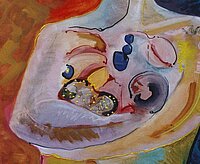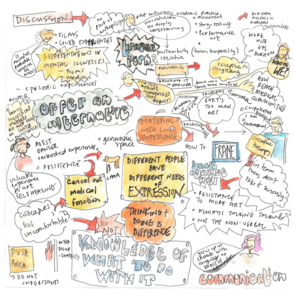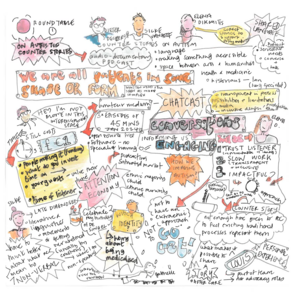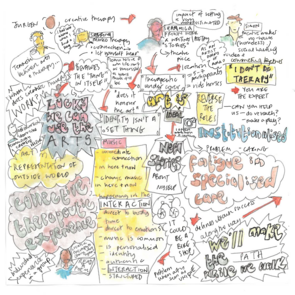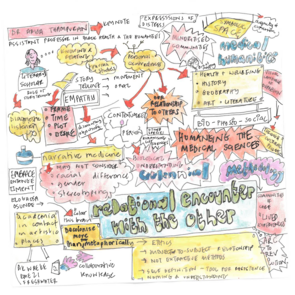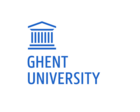Perspectives on Arts & Health
On Thursday, September 28, 2023, the 3i University Network invited individuals from various backgrounds to a convergence of art and health at the Museum Dr. Guislain. Ghent, Leuven, Lille, and Kent universities, collectively known as the "3i University Network," extended a warm welcome to the inquisitive, the interested, and professionals alike for a day filled with discussions, roundtable talks, a convivial lunch, and a reception.
It promised a pleasant and open atmosphere, encouraging everyone to participate actively by listening, speaking and exploring the diverse intersections of art and health.
At the event, there were presentations from colleagues across the four 3i University partner institutions. More than 90 people attended, including researchers from various disciplines, health professionals, arts & heritage organisations and members of the public. This event was a unique initiative in bringing together multi-disciplinary stakeholders at the intersection of arts and health in the cross-Channel area.
[I]t was only one year ago that I was invited to attend a day in Brussels by this 3i-network on Health Humanities. It was an eyeopener for me to hear and see so many academics and researchers working in a field that our museum was starting to explore deeper and deeper. Last year I could only have dreamed that the annual meeting of this university network took place in our museum.
Bart Marius, Artistic Director of Museum Dr. Guislain
We live in a world of vast extremes and differing perspectives on health. The pandemic years of Covid-19 highlighted the bio-social structure of wellness framed by the inequity of global healthcare, and how the agency of “humanising the medical sciences” steadies the medicalisation of humanness. With these thoughts interdisciplinary conversations grew louder between 3i-Network members who were actively exploring the potential of health humanities, increasingly aware that parallel conversations were similarly growing in nonacademic sectors.
Keynote: Medial Humanities and Intersectionality
The opening keynote was presented by Dr. Arya Thampuran – assistant professor in black health and the humanities at Durham University – who theoretically situated medical humanities. As a literary scholar she foregrounded “the relational encounter with each other” to reflect on how “the narrative of medicine” may not consider racial difference, gender, or stereotyping. In Dr. Tampuran’s presentation the importance of the “contextualized person”, of person-centeredness, relies on “empathy”, “embracing entanglement”, “nurturing the dignity of expression”, and fostering the “visual language of expression”. These are elements of “humanising the life sciences” which for storytelling (physical, visual, and oral); art; literature; history, and geography are so significant.
Dr. Thampuran’s keynote prompted a lively discussion from a dancer, a paramedic and others who added a consensus of the role of narratives which, “offer an alternative” and a means for “different people who have different needs of expression” to be reached and heard earlier in their lived experience. However, against the positivity were also descriptions of “how does medical humanities come across” when “in the team they don’t take it seriously” or that “colleagues feel uncomfortable”.
Roundtable on widening access to research
The first roundtable was chaired by Dr Dieter Declercq which focused on “autistic counter stories” through the medium of audio documentary and podcasting. Joining Dr. Declercq were award-winning podcaster Elena Dikomitis and neurodivergent researcher/dramaturg Silke Vanhoof who spoke of “how we imagine autism” and of “conversations informing and engaging us”. Compelling audio clips from podcast contributors were played to communicate 5 the potential of a non-extractive “amateur medium” when it follows the rules – identified by Dikomitis of 1) trusting the listener 2) making it slow and transparent work, and 3) being impactful.
Roundtable on art as therapy
Prof. Jürgen Pieter’s roundtable Art and/as therapy stimulated discussions around belief that it is “lucky that we can use the arts” but also the tensions between arts and therapy. The speakers on his panel were Sharmila Madhvani, psychologist and author, Simon Allemeersch, university researcher & theatre maker/author, and Sabrina Vanpoucke, art and music therapist and lecturer. Their skills and experiences spanned belief in “art as an ideal for making new stories about myself”, to the opportunity it offers to interact, to advocating that “we’ll make the path as we walk”.
Short presentations on developments in health humanities
In between the roundtables were a series of short talks which intended to give more time for the audience to question than presenters to present. The themes were on the Questioning Health Narratives by professors from Lille University Simona de Iulio and Laurence Favier, Eating Together, a therapeutic art? by Dr. Bernardine Farrell from the University of Kent, and Body diversity on display from Dr. Tinne Claus of the forthcoming Vesalius Museum, Leuven. Professors de Iulio and Favier’s presentation shared the evolution of health, medicine and illness narratives from folk, oral, religious, and bimedical perspectives to examine social definitions, materiality, and ultimately how communication expresses health. Dr. Farrell shared her research on the tensions between positive and negative experiences of commensality – and discussed with the audience about the impactful role of sensory empathy and shared eating’s potential to health, whilst Dr. Claus presented the lateral and creative ways the museum is developing stories that challenge the “normative view” of the body.
Closing plenary
The plenary from Prof. Tessa Kerre, head of clinic, Ghent University Hospital, Prof. Piet Bracke, health sociologist, Ghent University and Dr. Fleur Helewaut, general practitioner, Belgium took different perspectives yet Dr. Helewaut’s conviction that “medicine is not just science it is art” was powerful and pertinent. Each spoke of their knowledge and experiences of the tensions between commitment to “person orientated care” and “compassionate care” against recognition that the “most important – taking care of a person – is disappearing from check lists”. The uncertainty to how human centric health can be, from a sociological standpoint, was voiced as “how societies are organised”.
Programme
10:16-10:30 | Welcome!
Bart Marius, artistic director Museum Dr. Guislain, Belgium
10:30 -11:30 | Keynote: What is Medical Humanities?
This talk will highlight key issues and interventions in the critical medical humanities, offering an overview on current and future directions in the field.
Dr. Arya Thampuran, assistant professor, Institute for Medical Humanities, University of Durham, UK
11:30 -11.45 | Break
11:45 -12:45 | Roundtable 1: Research for a wider audience: a podcast about autism research and lived experiences.
We will reflect on the possibilities of podcasting as a medium and what it teaches us about the general opportunities and challenges of public engagement with research.
Dr. Dieter Declercq, senior lecturer in film and media, University of Kent, UK
Elena Dikomitis, podcaster and humanitarian aid worker, Belgium
Silke Vanhoof, neurodivergent researcher and dramaturg, WeThePeople, Belgium
12:45-13:30 | Lunch and ‘Open Market’ with representatives of arts and heritage organisations
13:30-15:00 | Short presentations
Questioning Health Narratives
Prof. Simona De Iulio and Prof. Laurence Favier, information and communication sciences, University of Lille, France
Eating together – a therapeutic art?
Dr. Bernardine Farrell, researcher, University of Kent & FoodSEqual project, Universities of Reading/Plymouth, UK
Body Diversity on Display: Experiences and Reflections from a Museum in the Making
Dr. Tinne Claes and Annelies Vogels, Vesalius, KU Leuven & UZ Leuven
15:00 - 15:30 | Break and Open Market
15:30 -16:30 | Roundtable 2: Art and/as Therapy.
We will discuss what could be meant by the word ‘therapy’ - its goals and effects; artistic objects and practices; and its 'value' amongst different forms of arts therapy.
Prof. Jürgen Pieters, literary theory, University of Ghent, Belgium
Sharmila Madhvani, psychologist and author, Belgium
Simon Allemeersch, researcher, faculty of psychology and educational sciences, University of Ghent, Belgium & theatre maker/author, Belgium
Sabrina Vanpoucke, art therapist and lecturer music therapy, Arteveldehogeschool, Belgium
16:30-17:00 | Closing plenary
Prof. Tessa Kerre, Head of Clinic, Ghent University Hospital
Prof. Piet Bracke, health sociologist at University of Ghent
Dr. Fleur Helewaut, general practitioner, Belgium
17:00-18:00 | Reception
Practical information
Where?
Museum Dr. Guislain
Jozef Guislainstraat 43B, 9000 Gent, Belgium
When?
Thursday, September 28 at 10:15 AM - 6:00 PM
Participation costs ?
Standard: €10 | Student: €5 | Social rate: €2 (lunch included)
